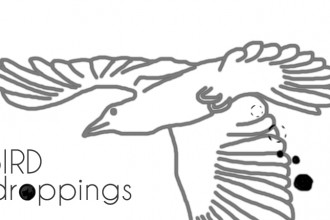Following the passengers ahead, Dhara rushed past the corridors. Her muscles loosened up and her swollen feet didn’t hurt as much. When she reached the immigration counters, the line had turned around, zigzagged a few times and she found herself at the end of a mob already waiting. This crowded an airport at three in the morning?
The rise in room temperature felt sudden and strong. Dhara took off her cardigan. She noticed her flight neighbor behind in the line staring at the edge of her tank top, tight-lipped. She looked down at her shoulder. A purple bra strap peeping out. She looked back at aunty and nodded.
The guy ahead of Dhara was getting rid of his orange hoodie. She looked at his gelled black curly hair. He was the guy seated in the plane’s front row.
“Did you enjoy L.A.?†She asked him, her finger pointing to Caltech written across his sweatshirt.
 “Loved it.†He turned around and smiled. “Amazing how the weather spoils you. Better get out before the sun lassos you for good, right?â€
“What brings you to Mumbai?†She tried to place his hybrid accent. He looked Indian but wasn’t. Not American either.
“Good job offer. And just to be somewhere new.â€
“L.A. to Mumbai. That’s quite a switch.â€
His shoulders rose and fell. “It’s only for a year.â€
As they moved forward in the line, Dhara learned that this was his first time in Mumbai, home city to his parents until they moved to Lagos, Nigeria, and then to Leicester, England. He’d always wanted to visit Mumbai and work had finally brought him here.
“So what brings you back?†he said.
“Want to belong somewhere. Living out of boxes starts getting old.â€
He nodded. “Return to roots.â€
“That’s a way to look at it.†She pushed her bangs behind her ear.
The guy looked at Dhara, as if waiting to hear more. Dhara found herself opening up to a stranger. She shared apprehensions toward family reactions, were she to give up the McKinzie gig in Manhattan and start over. In Bollywood and the arts, at thirty-two. Time to settle down, not to start all over again. Not in the arts, and certainly not, Bollywood. Such corrupting influence the showbiz industry. And so little financial security, they’d say. Besides, it was time she supported her widowed mother. And created stories other than the survival game, for both of them.
“You should’ve heard my old man on this move to India.†The Caltech guy looked at the airport’s tiled flooring. He shared his family’s wrath when he decided to switch countries again at the peak of his career. “That dharma shit is over-rated. Or maybe, just misunderstood,†his words continued a lingering silence. “For at the end of the day, if you choose duty over joy, you lose big.†He looked back at her.
When he picked up his bag and moved toward the lady behind the immigration kiosk, Dhara sensed that he wanted to continue the conversation. She waved goodbye, resisting her desire to ask his name.
When she moved forward for her turn, the lady behind the immigration counter neither looked at her nor smiled. Head pored over papers, the lady’s arm reached out for the passport, flipped a few pages, stamped the right one and threw it back on the desk. Dhara thanked here; the lady lifted her arm to summon the next passenger.
At the conveyer belt, Dhara saw her red Samsonite moving toward her. She sandwiched herself between two families and pulled the suitcase off. A short, skinny guy came over, asked if she needed help with her bag, then moved on to other foreigners.
Dhara followed the exit sign. Amazing how much the airport had changed. Duty-free shops, new food court with American chains and Indian fast food, a Coffee Bean with people typing on their laptops. Billboards for Absolut vodka and iPhone hung above the arrival hall. A lady at a kiosk asked, “Exchange currency, Ma’am?†Another guy came over and asked, “Taxi, madam?â€
Why were they asking her? This was her country and Ma was coming to pick her up in Cool Cab. Don’t you see me or what, people? Brown skin, black eyes, black hair. Her eyebrows furrowed. She overheard a man talking on his cell phone about the bland airplane food. “Maha pakao,†he said. It was the Bombay lingo she hadn’t heard in ages.
When she stepped out of the air-conditioned corridor into the arrival hall, a wave of heat slammed her. A mob was growing, held back by a frail iron railing. Wow, are we that many? That too, this short and skinny?
She pulled her hair up into a ponytail to air her neck. She noticed people from behind the railing staring at her. She pushed the purple bra strap back into her tank top. She’d gotten used to Chicago’s muggy summers, but this early monsoon humidity felt so much heavier. She looked up and saw a foggy sky – neither dark nor bright. Just a steady, opaque gray hiding the stars. A trickle of sweat flowed under her tank top. She pulled her top back and forth to relieve herself. She sniffed the foul-smelling air for traces of fresh oxygen.
She looked for Ma in the tsunami of people. And she found her own people staring back at her. Their eyes – dark and still – were mirroring her own look of confusion, irritation and disdain.
Dr. Namrata Poddar holds a Ph.D. in French and Francophone literature from the University of Pennsylvania. She has worked as Andrew W. Mellon Visiting Assistant Professor in the Humanities’ postdoctoral program on Transnational Cultures at the University of California, Los Angeles, and has published as a literary critic on island cultures in English and French in academic journals across the world. She is currently pursuing MFA in Fiction at the Bennington Writing Seminars, Vermont.




